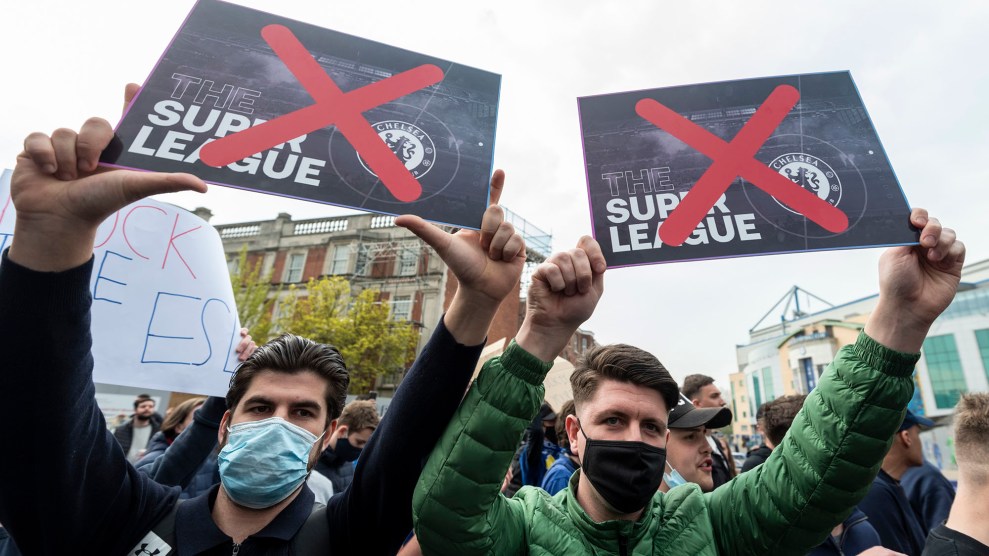
On Sunday, the soccer world was rocked by an attempted coup. Twelve of the richest and most storied clubs in England, Spain, and Italy announced that they were breaking away from the continent’s preeminent international competition, the Champions League, and forming their own permanent event, which they were calling the Super League. A statement on the Super League’s new website promised they would soon be joined by three more unnamed defectors. Five “annual qualifiers” from outside the league would be invited to participate each year, bringing their number to a nice round 20. “By bringing together the best clubs and best players in the world, the Super League will deliver excitement and drama never before seen in football,” they promised.
But not everyone was on board. The biggest clubs in Germany and France vowed not to take part. Smaller teams across the continent attacked these participants as traitors to the sport. Even many fans of some Super League clubs denounced the project. There were protests and demands for punitive measures—talk of kicking participant clubs out of current competitions, of imposing sanctions, and of banning players from international events such as the World Cup and the upcoming European championships. British prime minister Boris Johnson promised to do everything he could to stop it. By Tuesday afternoon, after the London club Chelsea signaled it would seek to withdraw from the arrangement, the coup appeared to be collapsing.
Normally, Johnson coming out against a proposal would make me think twice, but even a reactionary muppet sometimes ends up on the right side of things. The Super League is an awful idea. I hate it. It is antithetical to everything I love about sports, in part because like all of the worst trends in sports, it is not really about sports. It is emblematic of the ways in which the ultra-powerful can use an already rigged system to consolidate ever more resources for themselves. As a sporting construct, it would be destructive. But as a metaphor, it is perfect: The point of the Super League, like that of all elite endeavors, is to ensure that the right people always win, even when they lose. Even as it was falling apart, it was hard to feel too much joy—these guys only fail up.
The economics of the proposal were straightforward. As Rory Smith explained in the New York Times:
The clubs believe that selling the broadcast rights for the Super League, as well as the commercial income, will be worth billions. And it will all go to them, rather than being redistributed to smaller clubs and lesser leagues through European soccer’s governing body, UEFA. At the same time, the value of domestic leagues and their clubs will diminish drastically as they are effectively rendered also-rans every year.
Like I said: simple. The plan was to blow up both Europe’s signature club competition and the domestic leagues whose winners earn places in it, in order to take a far, far greater slice of the profits. Rather than hundreds of teams all over Europe competing for a slice of the multi-billion dollar Champions League profits, the Super League would split all that money just 15 ways.* (The “annual qualifiers” would, amazingly, earn less money if they were to win the Super League than founders would take home just for playing in it.) For smaller clubs that have already been crushed by a season-and-a-half without beer and ticket sales, the blow to the domestic leagues would be an extinction-level event. Soccer is hardly the only industry being devastated by corporate consolidation, but it’s stunning to see it play out with such arrogance.
The new league’s founding partners were a sort of Whitman’s Sampler of ghouls from both sides of the Atlantic. They included John Henry, the lead owner of Liverpool and the Boston Red Sox, famous for trading away one of the most talented players in his team’s history for something called “payroll flexibility”; Stan Kroenke, the owner of Arsenal and the Los Angeles Rams, who left St. Louis taxpayers on the hook for millions for an empty stadium when he relocated his NFL franchise out of that city. There was also Roman Abramovich, the Russian oligarch whose acquisition of the London club Chelsea poured gasoline on the sport’s inequities, and Sheikh Mansour, owner of Manchester City and chairman of the sovereign wealth fund of the United Arab Emirates. I’m not even really sure how best to blithely categorize Florentino Perez, the Real Madrid president who on Monday argued that the Super League would lift all boats through trickle-down economics.
These are, by price tag anyway, some of the biggest clubs in the world, but one of the things that made the gambit so brazen was that it was not by any measure a collection of the actual best men’s clubs on the continent. Yes, there were titans, such as Real Madrid, but none of last year’s Champions League semifinalists are part of the Super League, and some of the entrants are decidedly mediocre. Arsenal, a founding Super League member, is in ninth place in England and has not qualified for the Champions League since 2017. Its London rival, Tottenham, sits in seventh and has never won a premier league title. Neither team has ever been the best men’s team in Europe; they just happened to be rich at the right moment. It would be like describing the Beatles, the Rolling Stones, and Eve 6 as “some of the biggest bands of all time.”
So the innovation here was not really that finally “the best teams play against each other,” as one novice put it—that’s what the current Champions League is. The innovation was that they designed a format in which you don’t have to be the best to play each other and hoard all the money. You would no longer have to qualify to be in this league, which is to say, you could no longer fail to qualify for this league, which is to say, nobody else could qualify in your place even if they were more deserving. They aimed to disassociate the competition from on-field performance entirely.
Men are not the only people who play soccer for these clubs, though you’d be hard-pressed to find much evidence of that from the early Super League discussion. But the potential consequences of this proposal for the women’s game are clarifying in thinking about who this league was really designed for. In a belated statement on Monday reminiscent of the excuse you send your professor asking for an extension on your final, Super League organizers said, “As soon as practicable after the start of the men’s competition, a corresponding women’s league will also be launched, helping to advance and develop the women’s game.” Sounds like they put a lot of thought into it!
But what was so super about this new women’s Super League? The member clubs have won a combined total of one (1) Champions League title; teams outside the Super League have won 18. Some of these ultra-rich clubs have treated their women’s teams as less than afterthoughts. Manchester United has had a women’s team for all of three years. Mighty Liverpool—whose American ownership group, led by Henry, has been a driving force in the Super League concept—was relegated to England’s second division and is still stuck there. There are also some very good teams, but the effect would be to cleave a growing sport into two very unequal pieces—to nuke the growing women’s game to make more money off the men.
One of the early arguments in defense of the Super League was that it more closely resembles the way leagues are structured in the United States. That’s good branding if you haven’t really thought about it, because American sports leagues are quite popular. But this was true only in the most cynical sense—befitting the American businessmen who helped shape this proposal, it embraced some of the monopolistic qualities of American professional sports and took steps to rein in player salaries in order to make these clubs more efficient money-printers for their owners no matter how they perform. But it was still unlike the American system in a key way.
The whole point of the Champions League, and of every single level of every European soccer federation that feeds into it, is that it is merit-based. If you play really well, you get promoted. If you play really poorly, you get demoted. At the very top of the “pyramid,” as this is known, sits the Champions League. Win your country’s top league (or achieve a high-enough finish, depending on the status of that league) and you qualify for that competition—what is, essentially, The Playoffs.
There have always been big clubs and small clubs, and over the last few decades, as billionaires and sovereign wealth funds and one particularly hated energy-drink kingpin have poured more and more money into the game, the rampant inequality within the sport has shifted into overdrive. Ever more of the qualifying slots and ever more of the money is reserved for the biggest and richest leagues and biggest and richest clubs—in fact, even as the Super League was being rolled out, UEFA was approving more concessions designed to make the Champions League more favorable for the sport’s elite.
But the premise still exists that if you win, say, the Azerbaijani top flight (congrats to Qarabağ FK), or if you are some club from the Midlands with 5,000-to-1 odds that shocks the world to win the English Premier League, you can at least get a spot in the tournament. Amid the enormous corruption, the horrible characters wielding power, the structural and also very visceral racism, the human rights whitewashing, and the increasingly rigged and top-heavy system, this is the kernel of a soul holding everything together—that sports are, after all, still about sports.
The Super League wanted to simply kill that idea. It would tell everyone else in the leagues they’re leaving behind that no matter how well you do, you cannot make the playoffs. (You would perhaps, if you were lucky, earn one of those five annual invites—for which the qualification standards were as opaque as their plans for the women’s league.) There is something inherently absurd about comparing a 55-nation continental confederation with literally hundreds of levels of competitive play to an American league with an anti-trust exemption, but this is, to be clear, not how your favorite American sports work.
It is more than a little disconcerting to find oneself manning the same barricade as Boris Johnson, and to see so many people conscripted into the defense of a status quo that is in many ways indefensible. Some of the pushback had notes of a reactionary nationalism, blaming the American owners for what was truly a collective effort by all the worst actors on multiple continents. (I saw someone yesterday say that the Super League was a “betrayal of Prince Philip’s legacy.” What does that even mean!) Paris-St. Germain, which might have helped tank the Super League by rejecting its offer, exists primarily as an image management apparatus of the government of Qatar. They are not heroes standing up for the little guys; they are just a slightly different problem.
The economics of men’s European soccer are grotesque. There are layers upon layers of corruption and excess, and so there’s a good bit of truth to the refrain that opponents of the new cartel were simply carrying water for an old one. Members of FIFA, according to US prosecutors, took bribes to award the next men’s World Cup to Qatar, which has used slave labor to build stadiums in the desert. Members of FIFA allegedly took bribes to award the last men’s World Cup to Russia. Clubs like PSG, or last year’s European champions Bayern Munich, are perfectly happy to continue to throw their weight around to poison the system in other ways.
But it’s okay to think that most of the leadership of FIFA and UEFA and perhaps some of these clubs’ officials and definitely everyone involved in giving the World Cup to Qatar should be shot into orbit on one of Elon Musk’s stupid rockets and also think that the Super League gambit would have cemented some of the worst trends of the last few decades—that a grossly unequal Champions League and top-heavy domestic competitions are nonetheless preferable to having neither of those things, that wrecking hundreds of small clubs and leagues to lock in profits for a tiny group of extraordinarily rich people is bad, actually, in many of the same ways that breaking the back of minor league baseball is bad. The solution to the problem of rampant inequality and moral depravity is not to make the oligarchy more official—lord knows we have enough of that already.
For now, the pressure campaign seems to be working. On Tuesday, Chelsea supporters picketed outside their West London stadium hours before a home match, and the club signaled to reporters that it was looking into withdrawing its paperwork. Roman Abramovich: friend of the little man. Manchester City looked to be bowing out too. John Henry’s players at Liverpool’s men’s side put out a statement opposing the plan. Representatives of the 12 breakaway clubs were preparing to meet the discuss the next steps forward, or in their case, backward. It is gratifying to see these clubs take a punch right now, but if they return to the fold, it will be with a twinge of embarrassment and no less power. As everyone from Downing Street to the Bosporus voiced their outrage, one statement seemed to capture the ephemerality of the opposition—the thoroughness with which, even with the future of the Super League uncertain, the biggest behemoths already live in a world in which the house always wins.
“Part of the drama and beauty of European football comes from the ability of any club to achieve success through the performances on the pitch,” it read.
It was a touching statement, coming as it did, from Amazon Prime.
An earlier version of this article mischaracterized how Champions League winnings are allocated.

















